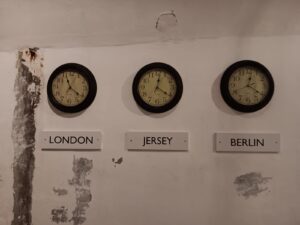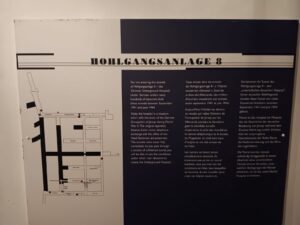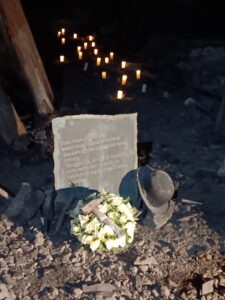In this weeks #ForgottenFriday, our fabulous Archive Assistant Trish has written about the Channel Islands being occupied during the Second World War!
On the 28th of June 1940 an air raid over St. Helier and La Rocque harbours on the island of Jersey, killing eleven Islanders and injuring many others, signalled the beginning of the intention of the Germans to occupy the British Isles. Earlier in the month the two largest islands, Jersey and Guernsey, had taken part in the evacuation the armed forces from the beaches of Dunkirk. The Germans entered St. Malo as the flotilla of boats left the area.
Fearing that the Islands would be next in the Germans path, the locals were given an option of staying or leaving for the UK. They were given 24 hours to decide and had to register if they wanted to leave. At the final count it was estimated that over 23,000 Islanders had registered for evacuation. The banks had to limit withdrawals to £25 each as there was a danger of them running out of money completely with everyone trying to take out their savings.
The people who chose to leave could only take with them what possessions they could carry. Many dogs and cats (over 6,000) were destroyed by the Blue Cross and many others were abandoned to fend for themselves.
Once many of the Islanders saw the conditions by which they were to be transported many of them changed their minds and decided to stay. In the end out of the 23,000+ who registered to leave only 6,600 left.
After the hurly burly of the panicked evacuations there was a degree of calm settling on the Islands as everyone waited to see what would happen next.

The waiting was soon over, the German air raids took place on 28th June 1940. The killing of innocent civilians on undefended islands caused an outcry on the mainland but the Germans did not know that the Channel Islands were undefended. Once they were aware of this, they marched straight in. On the 1st July ultimatums were issued to the islanders by a leaflet air drop stating that they should show their compliance to the German forces by flying white flags from their houses and buildings. A white cross was even painted in Royal Square. Even as the Bailiffe of Jersey was taking down the Union flag he was told that the Germans had arrived at the airport.
For Hitler the gaining control of the Channel Islands was a strategic victory and he was proud to have gained part of the British Isles. So much so he planned to turn them into holiday destinations for Germans after the war. The perfect location for the Kraft Durch Freude (Strength Through Joy) Holiday Camps.
Fearing that the British would try to retake the islands, Hitler ordered fortification of gun emplacements, bunkers and other defences on a large scale. Jersey was to be turned into an impregnable fortress. So in turn began the construction of the war tunnels, these being created to house stockpiled munitions and safe shelter for German troops in the event of any air and sea attacks from Allied Forces. The work on the tunnel complex known as Ho8 (abbreviated from the German for Hohlgangsanlage 8) began in September 1941.

The Germans brought in more than 5,000 foreign workers to construct fortifications and the tunnels, most of whom were housed in 14 camps around the island. Among the labourers were Russian workers who were treated very badly by the Germans and were practically starved and beaten, causing many of them to abscond from their camps at night and go scavenging for food and clothes. A worrying time for the local people who had very little for themselves.
Most of the tunnel complex was built by October 1943, however, fearing an assault on Jersey, it was turned into a Casualty Receiving Station in 1944 that could continue to function under any circumstance. The hospital was fully equipped but in the event never needed, when the Allies attacked on D Day they didn’t go near the Channel Islands but simply avoided them.
Ho8 is the best known and best preserved of the tunnels built on Jersey and is now a popular visitor attraction The Jersey War Tunnels.

Following the unconditional surrender of the German High Command on 7 May 1945, it was two days later when the Islands were liberated. The first British soldiers set foot on Jersey on 9 May 1945. This was the cue for much celebrating among the local people, just as it had done all over the United Kingdom the day before.
Winston Churchill had stated at the time before and during the German Occupation that he would not defend the Channel Islands because the loss of life in doing so would be too great and that the Islanders would have a better chance of survival under German rule.
A future article is planned talking about how the local people managed during the occupation, including the curfews, rationing, escapers, non-Island born inhabitants, Spies and the consequences of their actions during and after the war.

